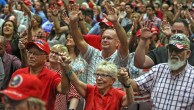Summary of Findings
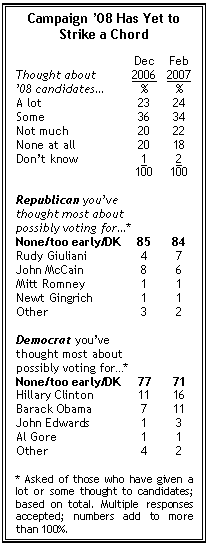
The 2008 presidential campaign has kicked off earlier than usual with more candidates than usual, but many people appear not to have noticed. Americans are no more likely to say they have given the presidential campaign much thought than they did in December, and just small minorities can name a candidate they might support.
The public’s lack of engagement in the campaign is reflected in how people are reacting to the large slates of potential candidates in both parties. Of the announced and highly probable candidates, only a few in each party are widely familiar. The results of in-depth questions suggest that the images of even the well-known candidates are fairly thin.
The latest national survey by the Pew Research Center for the People & the Press, conducted Feb. 7-11 among 1,509 Americans, finds that Democrats are further along than Republicans in thinking about possible presidential candidates. First, a larger percentage of the Democrats than Republicans are paying attention to the campaign (31% vs. 20%). Notably, 38% of liberal Democrats say they have given the campaign a lot of thought, compared with just 24% of conservative Republicans. And while nearly half of Democrats (46%) volunteered a presidential candidate they might support, only 29% of Republicans named a candidate for whom they might vote.
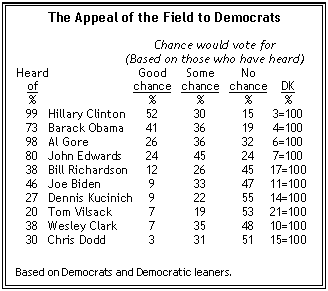
When asked to rate their chances of voting for announced or possible presidential candidates, large majorities of Democrats (and independents who lean Democrat) say they would consider voting for four candidates: Hillary Clinton, Barack Obama, Al Gore and John Edwards. Roughly eight-in-ten Democrats (82%) say there is a good chance or some chance they would vote for Clinton. A comparable number (77%) says there is at least some chance they would vote for Obama. However, more Democrats say there is a good chance they will vote for Clinton than say the same about Obama (by 52% to 41%).
Smaller but substantial majorities of Democrats also say there is a good or some chance they would vote for John Edwards (69%) or Al Gore (62%). But far fewer say there is a good chance they would vote for either of these candidates than say that about Clinton or Obama.
Among GOP candidates, just two attract possible support from large majorities of Republicans (and independents who lean Republican): 78% say there is a good or some chance that they would vote for Rudy Giuliani and 65% say the same about Sen. John McCain. Mitt Romney gets a comparable “acceptable” rating from 53% of Republicans, but Romney is still not well-known to most Republicans. Just 41% of Republicans say they have heard of Romney.
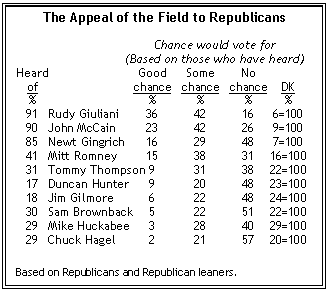
The candidate preferences of political independents, a group that could play an important role in the selection of both parties’ nominees, are quite different from those of political partisans. Obama has greater appeal among independents than does Clinton; 64% of independents who have heard of Obama say there is at least some chance they would vote for him, compared with 54% of those who have heard of Clinton. Among Republicans, Giuliani has somewhat more potential support among independents than does McCain (62% vs. 56%). Notably, Romney has attracted little support from independents; just 35% of those who have heard of him say there is a chance they could vote for the former Massachusetts governor, which is far less than the number of Republicans who say there is at least some chance they could vote for him (53%).
Candidate Impressions
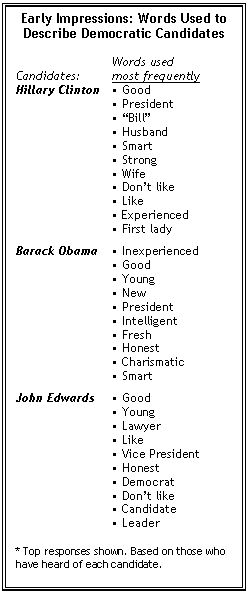
Specific impressions of the leading candidates generally reflect either the national roles they have played or the visible aspects of their backgrounds: Hillary Clinton as the wife of former President Bill Clinton; John McCain as a Vietnam POW; Rudy Giuliani as a mayor and 9/11 figure; and John Edwards as a lawyer and former vice presidential candidate.
Barack Obama is an exception to this pattern. When people are asked what comes to mind when they think of Obama, a lack of history predominates; words like “inexperienced,” “young,” and “new” are frequently mentioned. Others cite qualities like “charismatic” and “smart” to describe Obama.
Aside from general mentions of Clinton’s role as first lady, several people describe her as “smart” and “strong.” Others say they disliked (or liked) Clinton, while some also call her “experienced.”
Edwards’s image appears to be less clear at this early stage. Many respondents say simply that nothing comes to mind when asked about the former North Carolina senator. Other frequently used descriptions include “lawyer” and “vice president.”
Giuliani is closely associated with the city that he used to serve as mayor — more people mentioned “New York” to describe Giuliani than any other words. Related to his role in leading New York City after the Sept. 11 attacks, many people also mentioned “9/11,” “leader,” and “job” to describe him.
For many people, impressions of McCain are defined by his Vietnam service. Respondents used the words “war,” “veteran,” and “hero” to describe the Arizona Republican. A number also called McCain “experienced” and “old.”
As is the case with Edwards, impressions of Mitt Romney are fairly thin. Many said “nothing” came to mind or offered no response. The most frequently mentioned words include “conservative,” “Massachusetts,” and “governor.”
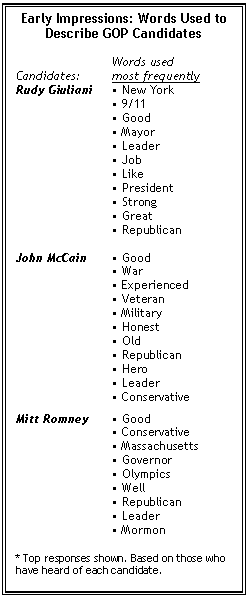
With the personal images of the candidates still emerging, so are the ways these personal qualities and attributes are playing with the public. An analysis of the survey results finds several patterns are apparent, but they are subject to change as more Americans focus on the campaign and the candidates:
- Gender is an important characteristic for some people in considering a vote for Hillary Clinton. Relatively few say gender would be an issue in their vote, but there is a strong correlation between views on this and opinions about the former first lady. Overall, a slight majority of men (51%) report there is at least some chance they will vote for Clinton while a somewhat larger majority of women (61%) say this.
- As many people say they are more inclined to vote for a black candidate as say they are less likely to do so; in both cases, the numbers are small (7% more likely/4% less likely). But on balance, Obama’s race is a positive; he gets a disproportionate share of backing from the former group. The Illinois senator also gets strong backing from African Americans themselves. However, he trails Clinton slightly in this key Democratic constituency.
- Many voters say they are reluctant to vote for a Mormon for president, and people of this point of view are less inclined to vote for Mitt Romney. However, Romney has greater appeal among those who say they would be more likely to vote for a Christian than those for whom this does not matter.
- Military experience is one of the traits that is most attractive to people when considering a president. However, 48% say they would be less likely to support a candidate in their 70s. At this point, those who prize military experience are giving stronger support to John McCain, but those who object to older candidates are not substantially more reluctant to back him.
- Similarly, while Americans are disinclined to vote for candidates who have had extramarital affairs, this attitude is not linked to an inclination to vote against Rudy Giuliani, who was accused of having an affair by his former wife. But the poll suggests that the former New York mayor’s support for gay rights does have the potential to hurt him among some Republicans: Those who say they would be less inclined to vote for a homosexual candidate are more likely to say there is no chance they will vote for Giuliani when compared with those for whom a candidate’s sexual orientation does not matter.
